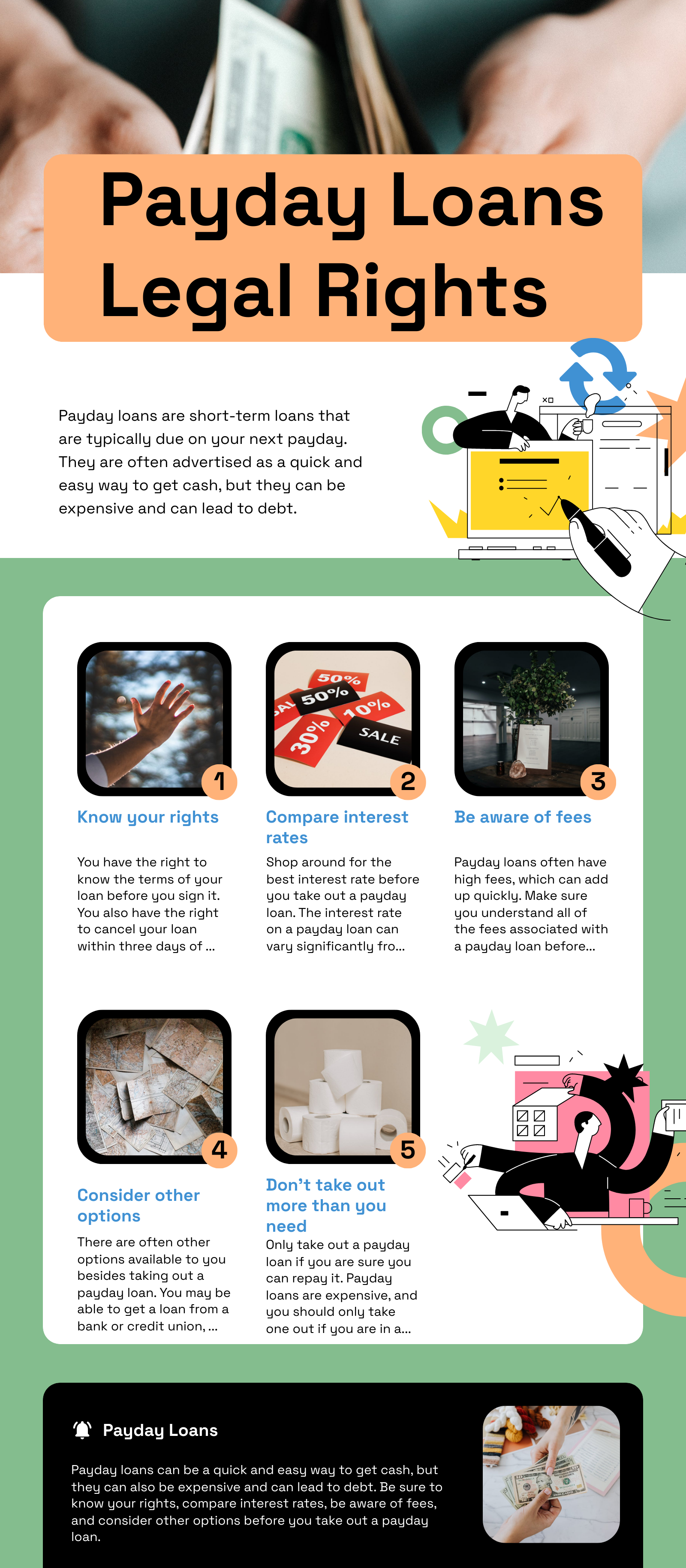Payday loans legal rights present complexities and unique challenges in the United States. Understanding your rights is crucial when dealing with payday loans, which are often associated with high annual percentage rates and can lead to a cycle of debt. Entities such as the Consumer Financial Protection Bureau play a significant role in regulating payday lending practices and enforcing laws that protect consumers from predatory financial practices.
Key Takeaways:
- Legal status of payday loans varies across states, with some implementing strict regulations or bans
- Consumer Financial Protection Bureau oversees payday lending and enforces federal regulations to protect borrowers
- Borrowers have rights to crucial loan information and fair lending practices under various regulations
- Understanding your ability to repay the loan is crucial to avoid falling into a debt trap
- Community Development Credit Unions offer affordable financial services as alternatives to payday loans
- Immigrants have specific rights and can access resources for payday loan information and support
- Consumer protections are in place to tackle illegal payday loan debt collection tactics
New York’s Stance on Payday Lending
Payday lending is a significant concern in New York due to its potential to trap borrowers in a cycle of high-interest loans and debt. As such, the state has implemented strict usury laws to protect consumers and outlaw payday lending practices. This section will delve into the reasons behind the ban on payday loans in New York and the legal implications for borrowers.
Why Payday Loans are Banned in New York
In New York, both criminal and civil usury laws outlaw payday lending, making it illegal for lenders to offer or collect on payday loans, whether in person, by telephone, or over the Internet. These usury laws aim to protect consumers from the exorbitant finance charges and predatory practices associated with payday lending.
The High Cost and Debt Cycle of Payday Loans
One of the main reasons for the ban on payday loans is their high-interest loans nature, which can carry annual percentage rates of 400% or higher. These loans are designed to trap borrowers in a debt trap and are often not based on the borrower’s ability to repay. This leads to repeated cycles of borrowing and accumulation of fees, which can be financially crippling for individuals.
Legal Implications of Taking Out a Payday Loan in NY
Given the strict regulations in New York, payday loans are void and unenforceable within the state, leaving consumers with no legal obligation to repay such debts. Consequently, lenders and borrowers alike can face legal ramifications for participating in payday loan transactions. It is crucial for residents of New York to be aware of these legal implications and seek alternative financial solutions rather than resorting to payday loans.
By understanding New York’s stance on payday lending and the consequences associated with these high-interest loans, you can make more informed decisions regarding your financial situation and protect yourself from falling into the trap of payday loan debt.
Payday Loans Legal Rights and Protections
As borrowers, you are entitled to specific rights and protections when it comes to payday loans. These rights are overseen by the Consumer Financial Protection Bureau (CFPB) and are governed by various federal regulations, including the Lending Act. Understanding your rights can enable you to make informed decisions and protect yourself from unfair lending practices.
One of the crucial rights you have is access to loan information for consumers. This information helps you evaluate loan terms, fees, and repayment options to determine whether a payday loan makes sense given your financial situation. Moreover, federal regulations require payday lenders to assess a borrower’s ability to repay the loan, ensuring that you are not provided with a loan that you cannot reasonably pay off in the allotted time frame.
Another resource for safer financial services is credit unions. They can offer alternatives to payday loans, provide financial education, and possibly help manage payday loan debt. Credit unions prioritize the financial well-being of their members and operate with transparency and fairness.
- Consumer Financial Protection Bureau
- Lending Act
- Loan Information for Consumers
- Federal Regulations
- Ability to Repay
- Credit Union
By being aware of your legal rights and protections related to payday loans and using resources such as credit unions, you can make informed decisions, avoid predatory lending, and safeguard your financial health. Always ensure you understand the loan terms before borrowing and stay vigilant about your rights under federal regulations.
Understanding the Consumer Financial Protection Bureau’s Role
The Consumer Financial Protection Bureau (CFPB) plays a critical role in safeguarding consumers from unethical payday lending practices by governing the industry. The CFPB focuses on multiple aspects of payday loans, such as advertising to debt collection, to ensure fairness and consumer protection.
How CFPB Rules Affect Payday Loans
The CFPB is responsible for implementing federal regulations aimed at protecting consumers from predatory payday lending. These regulations cover a wide range of practices, from the way payday loans are marketed to borrowers, to the tactics employed by payday lenders to collect debts. By enforcing these rules, the CFPB seeks to reduce instances of unfair and potentially harmful lending practices.

New Regulations and the Final Rule on Payday Lending
New federal regulations have been established in recent years to provide additional consumer financial protection against high-risk payday lending. One example is the Final Rule, which has been published in the Federal Register. This rule seeks to further safeguard consumers by addressing various concerning practices such as unreasonable fees collection, deceptive marketing, and unsuitable lending standards. As a result, payday lenders must now comply with the requirements outlined in the Final Rule to ensure compliance with federal law.
Avoiding the Debt Trap with Payday Loans
Entering a payday loan debt trap can worsen an already precarious financial situation. To protect yourself from falling into this cycle, it’s crucial to understand the tactics employed by payday lenders and assess your ability to repay the loan. Considering alternatives such as installment loans may provide additional options for short-term financial relief.
Tactics Employed by Payday Lenders
Payday lenders rely on a set of techniques designed to encourage borrowers to take out high-interest loans, which in turn fuels the debt trap. These tactics may include:
- Aggressive advertising that emphasizes swift cash availability and minimal requirements without highlighting the high interest rates and risks associated with these loans.
- Charging hidden fees and making complex loan agreements, which can mislead borrowers and add excessive costs to their debt.
- Encouraging repeat borrowing by making it easy to take out another loan immediately after paying off a previous one, further entrenching borrowers in ongoing debt.
Becoming aware of these tactics can help you make an informed decision and avoid the payday loan debt trap.
Assessing Your Ability to Repay the Loan
Before borrowing from payday lenders, consider your ability to repay the loan to prevent falling into a cycle of high-interest loans. Here are some steps to evaluate your repayment capacity:
- Review your monthly income and expenses to determine if you have adequate funds to repay the loan on time without compromising other essential payments.
- Check the terms of the loan, including interest rates, fees, and loan duration. That way, you’ll fully understand the total cost and impact on your finances.
- Consider alternative borrowing options such as installment loans, which might offer more favorable interest rates and repayment terms. Research credit unions and local financial institutions for potential loan opportunities.
Meticulously evaluating your ability to repay a payday loan ensures you make responsible borrowing decisions and steer clear of the debt trap associated with these high-interest loans.
The Truth in Lending Act and Payday Loans
The Truth in Lending Act (TILA) plays a critical role in protecting borrowers who engage in payday loans and other forms of short-term, high-interest credit. In this section of the article, we will explore the required disclosures that lenders must adhere to, as well as the fair lending practices and borrower rights under TILA.
Required Disclosures for Payday Loans
Under the Truth in Lending Act, all lenders, including those offering payday loans and installment loans, must provide borrowers with specific disclosures, ensuring that consumers have the necessary information to make informed financial decisions. Key disclosures required by the lending act include:
- Finance charges: Sum of all costs that borrowers will pay for obtaining credit. This may include high interests, application fees, and other charges associated with payday loans.
- Annual percentage rate (APR): A standard measure of the cost of credit expressed as a yearly percentage rate. This enables borrowers to compare different loan offers on an equal footing.
- Total obligation: The total amount that a borrower will be obligated to pay back, including the principal amount, interest, finance charges, and any other fees.
Fair Lending Practices and Borrowers’ Rights
The Truth in Lending Act also enforces fair lending practices, empowering borrowers by providing them with rights that protect them from predatory loan practices. Some of the borrower rights under TILA include:
- Right to receive accurate APR: Lenders must provide the accurate annual percentage rate before signing any loan agreement.
- Right to rescind the loan: Borrowers have a minimum three-business-day period to cancel a payday loan without paying any interest or fees. This period, known as the “cooling-off period,” provides borrowers an opportunity to rescind if they feel that they made a hasty decision or have a change of circumstances.
- Right to truthful advertising: Lenders must not use misleading or deceptive advertising practices. Borrowers are entitled to clear and accurate information about loan terms and conditions.
Understanding your rights under the Truth in Lending Act when taking out payday loans or installment loans can help ensure that you are adequately informed and protected from predatory practices. By knowing the required disclosures and your rights, you can make better decisions about your financial needs and avoid potential pitfalls associated with high-interest, short-term loans.
Handling Illegal Payday Loan Debt Collection
Dealing with debt collection can be a distressing experience, especially when it involves illegal payday loan debt. Consumers may encounter underhanded collection tactics that violate the Fair Debt Collection Practices Act (FDCPA). To protect the rights of consumers and safeguard financial stability, various tools and resources are available to combat debt collection abuse.

Fighting Back Against Debt Collection Abuse
Under the FDCPA, consumers have the right to be treated fairly and with respect during the debt collection process. Illegal practices include harassment, using threats, and disclosing personal debt information to unauthorized parties. To fight back against these tactics, it is crucial for consumers to familiarize themselves with the legal limitations imposed on debt collectors by the FDCPA and assert their rights when necessary.
Tools and Resources to Protect Consumers
Numerous consumer protection agencies offer resources and support to help individuals defend against illegal payday loan debt collection practices. These resources include:
- Filing complaints with regulatory bodies such as the NYC Department of Consumer Affairs, NYS Department of Financial Services, NYS Attorney General’s Office, and the Consumer Financial Protection Bureau (CFPB).
- Access to free informational material about the FDCPA and consumer rights during the debt collection process, provided by the Federal Trade Commission (FTC).
- Seeking assistance from consumer rights attorneys, who can provide legal advice and representation to protect consumer interests.
By utilizing these tools and resources, consumers can defend themselves against abusive debt collection practices and pave the way towards financial stability and peace of mind.
Community Resources and Credit Union Alternatives
If you are looking for a more affordable and reliable alternative to payday loans, consider joining a credit union, particularly Community Development Credit Unions (CDCUs). These nonprofit, community-based financial cooperatives prioritize the financial well-being of their members and provide low-cost financial services.
Some benefits of CDCUs include:
- Affordable savings and checking accounts
- Loans with reasonable terms and lower finance charges
- Lower annual percentage rates compared to payday loans
- Free financial counseling and educational resources
As a member of a credit union, you also have a say in the union’s governance. You can ensure that the institution remains focused on meeting the needs of its community members. This allows credit unions to provide personalized services and a sense of accountability to their members.
Invest time in exploring your options and becoming a member of a CDCU. That way, you can secure your financial future and avoid the risks associated with high-interest payday loans. Take advantage of the available community resources and credit union alternatives. That way, you’ll make informed financial decisions and improve your overall financial health.
Immigrant Rights and Payday Loan Information
Immigrants often face unique challenges within the banking system, including potential targeting by payday loan schemes. They have specific immigrant rights and can access resources that provide payday loan information, support with credit repair, and assistance with understanding rights regarding vehicle titles and other financial matters. Information is available in multiple languages including English, Spanish, and French, to ensure inclusivity and comprehension.
To further assist immigrants in navigating the complex world of payday loans and consumer financial protection, a variety of organizations offer resources and support. These organizations not only provide valuable information but also advocate for immigrant rights within the financial sector.
Here are some steps you can take as an immigrant to protect yourself against predatory lending schemes:
- Research the payday lending laws in your state and be aware of your rights as a consumer.
- Educate yourself on the terms and conditions of payday loans. That includes interest rates and fees, before agreeing to any loan contract.
- Beware of loans based on vehicle titles. These can carry high-interest rates and result in a loss of your vehicle if you fail to repay on time.
- Seek out nonprofit organizations that offer credit counseling and financial education specifically for immigrants. These organizations are well-equipped to help you understand the financial system in the United States. They can guide you through credit building and repair processes if necessary.
- If faced with financial hardship, explore alternative options such as community-based loans. Also explore financial assistance programs specifically designed to support immigrant communities.
By staying informed and utilizing the resources available to you, you can safeguard your financial stability. You can ensure that you are protected from predatory lending practices often targeting immigrants.
Conclusion
The complex world of payday loans presents various legalities depending on individual states’ regulations. Familiarizing yourself with your state’s legal status of payday loans can be crucial to evade the financial consequences that these short-term, high-interest loans often entail. This article has shed light on the importance of understanding your rights and the role of federal regulations in governing payday loans.
Summarizing the Legal Status of Payday Loans
Payday loans’ legal status varies significantly across the United States. Some states like New York impose a total ban based on their high finance charges. Also, it’s based on potential to trap borrowers in long-term debt. Other states regulate payday lending to protect consumers through the Truth in Lending Act and regulations enforced by the Consumer Financial Protection Bureau. Knowledge of your state’s regulations is paramount to ensure you borrow responsibly.
Empowering Yourself with the Right Knowledge
Take time to learn about payday loans and your legal rights. It can save you from the debt trap often associated with these loans. Utilizing resources provided by consumer protection agencies and educating yourself about the Truth in Lending Act can aid you through the borrowing process and avoid predatory lending practices. In addition, exploring alternative financial resources like credit unions and community development credit unions can help you find more sustainable ways to manage your finances and credit repair needs.




